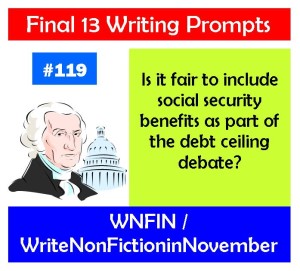Writing Prompt 119
Do you feel it is it fair to include social security benefits as part of the debt-ceiling debate?
If you have been following the news, chances are good you’ve heard about the government entering its second week of shut down. One of the things holding back the federal government in resuming operations is an inability to agree on the terms of President Barrack Obama’s new healthcare plan which, coincidentally (or not?), also entered its second week.
The healthcare plan and its possible solution to raise the debt ceiling and allow the United States to borrow more money are only a few of the pieces of this complicated puzzle. At stake, too, is a possible affect upon the payments made by the Social Security Administration. It is now being reported that many Americans entitled to receive social security payments may not, all because of the implementation of the healthcare plan. Today’s writing prompt asks nonfiction writers to consider whether this scenario is fair. Support your answer either way.
Nonfiction Writing: Expository (Explanatory)
Expository writing is the more formal title of a specific type of nonfiction writing that consists primarily of explanations. For example, writing about religious groups, their histories, their points of view, and the progress or changes made to the people and their belief systems is generally a research task. It takes great effort to study a religion and be able to write about it.
Academic textbooks and scholarly journals are two other forms of expository writing. There isn’t much room for opinion or first person points of view with this style of writing because the nonfiction writer is busy researching facts, synthesizing them into logical categories, and writing about them.
School-aged children in K-12 grades are the people most clearly affected by expository writing. Teachers must be able to teach facts and recite a great deal of information in order to educate children. Younger children often read and perceive expository writing through colorful pictures, displays, and videos, whereas older students receive expository writing in more serious ways.
In high school, college, and graduate school, expository writing in textbooks and academic journals gets even more complex. The older we get, the “drier” the information becomes. To deal with the dry or boring writing often evident in expository writing, I suggest you add personal feelings and enthusiasm to any subject of your choice. World religions, cultures, and scientific experiments, for example, are only as dull as you think they are. If you consider that learning is an exciting task that goes hand-in-hand with research and writing, it will make your reading and subsequent writing of expository materials easier to handle.
National Nonfiction Writing Month will be here soon. Are you ready to take the challenge?
To participate in the Write Nonfiction in November (WNFIN) challenge, register here. To find out more about WNFIN and NaNonFiWriMo, click here.
About t he Author
he Author
Amanda M. Socci is the creator of the 10-month training program for Write Nonfiction in November called “I Know I Can” WNFIN. The first two blog posts of the series explain more about this program and its benefits.
Amanda refers to herself as the Creative Idea Gal because she comes up with original ideas for herself and others. Based in Alexandria, VA, she is a devoted mother of two and a hopeless fanatic of all things creative. Connect with Amanda on Google+ or Twitter.